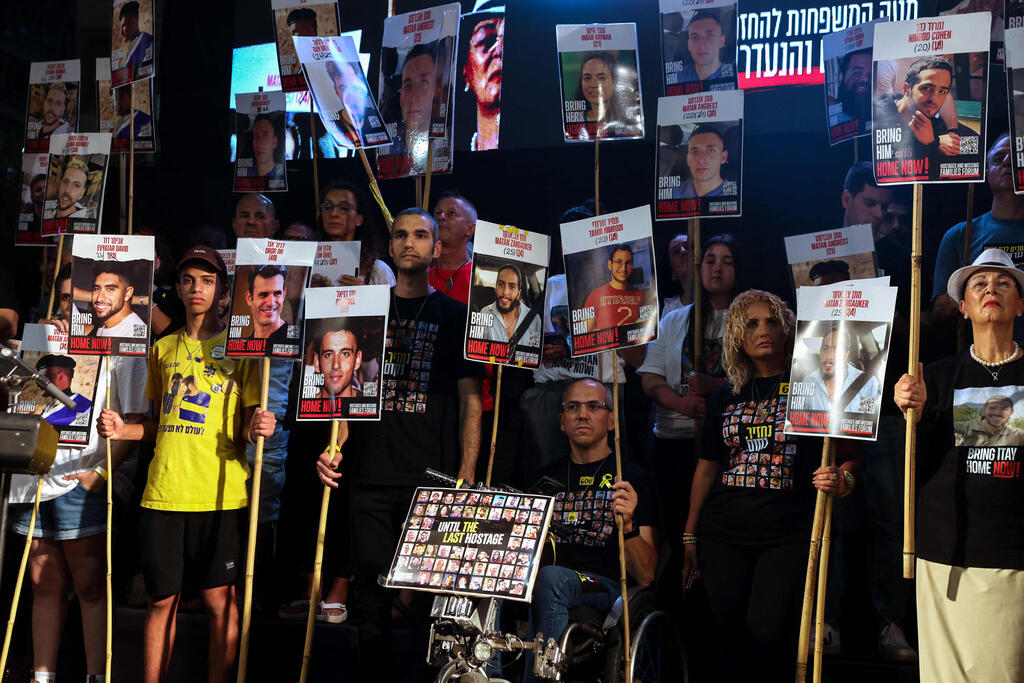Hamas announced Saturday afternoon that it had submitted its response to the latest ceasefire proposal presented by U.S. special envoy Steve Witkoff, but stopped short of clearly stating whether it accepted or rejected the deal.
In a statement, the terrorist group said the proposal "aims to achieve a permanent ceasefire, a comprehensive withdrawal from the Gaza Strip and ensure the flow of humanitarian aid to our people and families in Gaza." The group also noted that, as part of the deal, 10 living hostages and the bodies of 18 others would be released in exchange for an agreed number of Palestinian prisoners.
1 View gallery


Demonstrators in Tel Aviv demanding hostage release deal
(Photo: AHMAD GHARABLI / AFP)
An Israeli official responded by accusing Hamas of effectively rejecting Witkoff's proposal, saying the group had presented a new version with its own conditions. Israeli authorities continue to insist that the proposal must be accepted as it stands, and that any additions or reservations would require renewed negotiations.
Earlier Saturday, Saudi media reported that Hamas was expected to agree to the plan only in principle, while attaching terms and caveats. Israeli officials maintain that such a conditional response does not constitute acceptance under the terms presented.
Get the Ynetnews app on your smartphone: Google Play: https://bit.ly/4eJ37pE | Apple App Store: https://bit.ly/3ZL7iNv
According to Saudi broadcaster Al Hadath, Palestinian factions in Gaza have reportedly urged Hamas to accept the proposal, viewing it as an opportunity to halt the war and alleviate the humanitarian crisis, despite its shortcomings. One faction reportedly said, "This proposal could stop the hunger and displacement."
Witkoff's ceasefire outline proposes a 60-day halt to hostilities during which Hamas would release 10 living hostages and the remains of 18 others in two phases—half on the first day and half on the seventh. In exchange, Israel would release 125 Palestinian prisoners serving life sentences, 1,111 other Palestinian detainees from Gaza arrested over the course of the war and return 180 bodies of Palestinian terrorists. The plan also includes daily humanitarian aid deliveries to Gaza and stipulates that negotiations for a permanent end to hostilities would commence during the ceasefire period.
IDF strikes in the Gaza Strip, Saturday
Egyptian outlet Alghad TV reported, citing sources, that Hamas’ response to Egyptian and Qatari mediators includes a proposed timeline for the release of hostages in three phases: four on the first day, two on the 30th day and four on the 60th day. According to the conditions set by the terrorist group, the remains of deceased hostages would also be returned in three phases—on days 10, 30 and 50.
The sources added that Hamas’ response also includes demands for allowing Gaza residents to exit and re-enter the enclave via the Rafah crossing, in addition to a full IDF withdrawal and the launch of negotiations aimed at reaching a permanent ceasefire agreement.
Hamas’ response included new demands not present in the version approved by Israel, notably a “comprehensive” withdrawal of Israeli forces and a return to the previous model of humanitarian aid distribution—rather than through IDF-secured centers managed by a U.S.-based contractor.
As a result, Israeli officials said Hamas had effectively rejected Witkoff's plan and was attempting to impose a halt to the war unilaterally. Hamas also reiterated its demand that the release of hostages be staggered over the full 60-day ceasefire period, rather than within the first week—a condition Israel is expected to oppose. Israeli officials assess that the updated Witkoff Plan represented a final compromise, not a basis for further negotiation. The key question now is whether Israel will show any flexibility.
Palestinian crowd loots UN World Food Program humanitarian aid convoy in Gaza
About an hour after Hamas announced it had submitted its response to mediators, air raid sirens sounded in Ein HaShlosha and Nirim, communities near the Gaza border. The IDF reported that a “small number of launches” were detected crossing from the enclave and landing in unpopulated areas.
Meanwhile, heavy Israeli strikes were reported Saturday across northern and central Gaza, with Hamas-run health authorities reporting at least 15 casualties. The strikes are part of the IDF’s ongoing ground campaign and broader effort to evacuate civilian populations from combat zones.
Palestinian sources reported Israeli airstrikes on multiple locations, including a school in the al-Karama area northwest of Gaza City, targeted for the third time since the war began, and another near a school in Gaza City’s Daraj neighborhood.
Amid worsening humanitarian conditions, the World Food Program (WFP) warned that the situation in Gaza was spiraling out of control. Following the looting of 110 aid trucks, the agency stated: “Aid trucks are being looted, and people are risking everything for a sack of flour. We have enough food to feed 2.2 million people in Gaza for two months. A ceasefire is the only way to deliver aid safely.”




